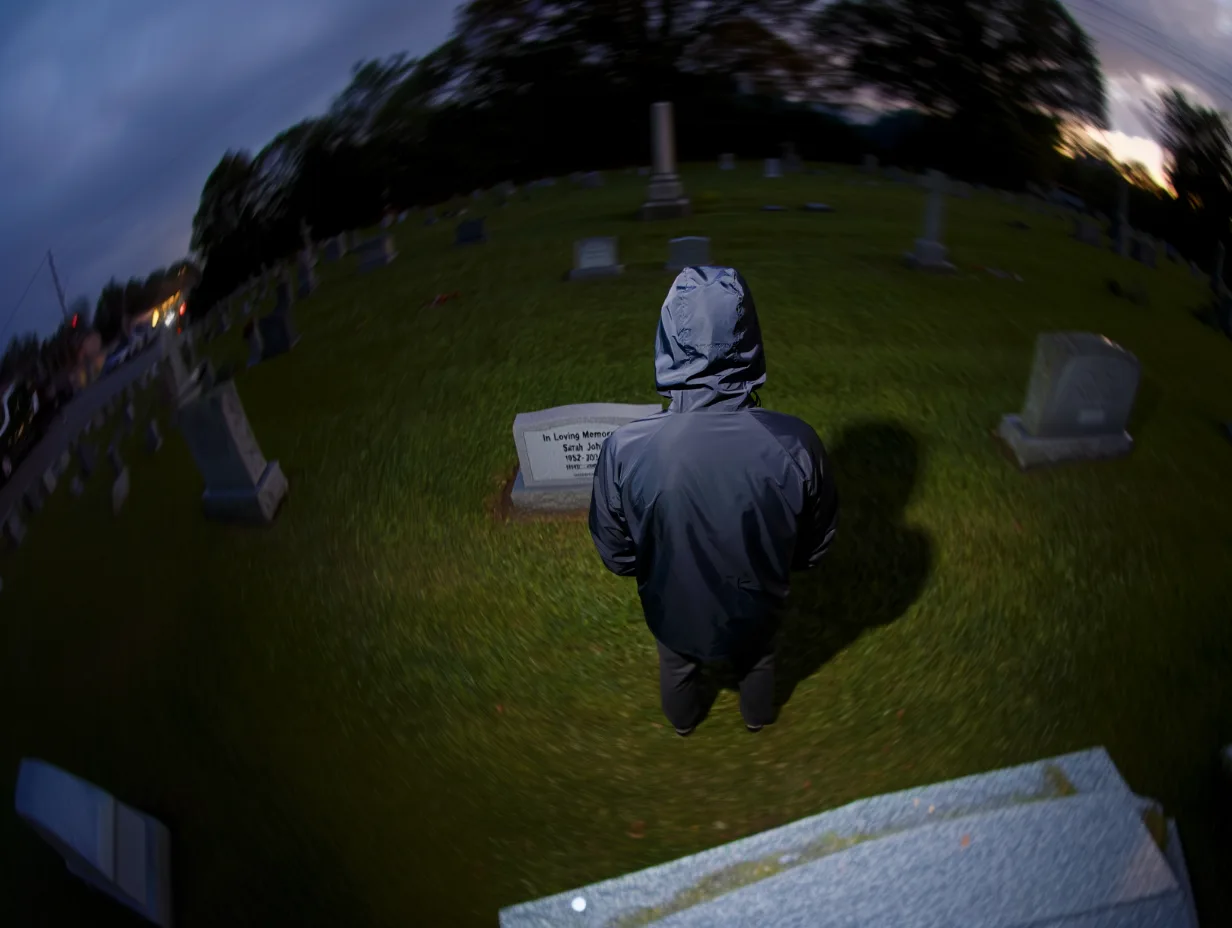The video stuttered, freezing on a figure half-hidden by rain. Someone knelt at her son’s grave, fingertips brushing the carved letters as if memorizing them. Ellen leaned closer to the screen, heart hammering. The timestamp read 2:37 a.m., long after the cemetery gates were locked. Someone had been there again.
She grabbed her coat and drove through the fog to the cemetery, headlights cutting narrow tunnels through mist. The moment she reached the headstone, she saw it: a new toy car, bright blue, glistening with dew. Her pulse thudded. Whoever left it knew exactly what Sam loved most.
Kneeling, Ellen ran her palm over the smoothed earth. It seemed a deliberate act—loving, almost reverent. “Who are you?” she whispered into the dark. For a moment, she feared the answer: a stranger, a thief of memory. But another part of her, the lonelier one, hoped it wasn’t just the wind rearranging what she loved.
Before the illness, Sam had been all motion and laughter—racing toy cars across the kitchen floor, and inventing names for each one. Then came the diagnosis, the long hospital corridors, the machines that hummed through every night. Two years of treatments, two years of hope, fraying one thread at a time.

Ellen could still remember the way he’d smiled, even when breathing took effort. He’d called her “Momma racer” the morning before he slipped away, promising she’d win for both of them. After the funeral, three years ago, the world had turned quiet, everything running on half-speed, as if waiting for something that never came.
Morning light softened the rows of headstones as Ellen approached, damp grass brushing her shoes. Her son’s grave looked different—cleaner, the marble bright, and the flowers turned upright as if someone had arranged them. She frowned, crouching closer. The soil was smooth and unbroken. Someone had cleaned the grave.
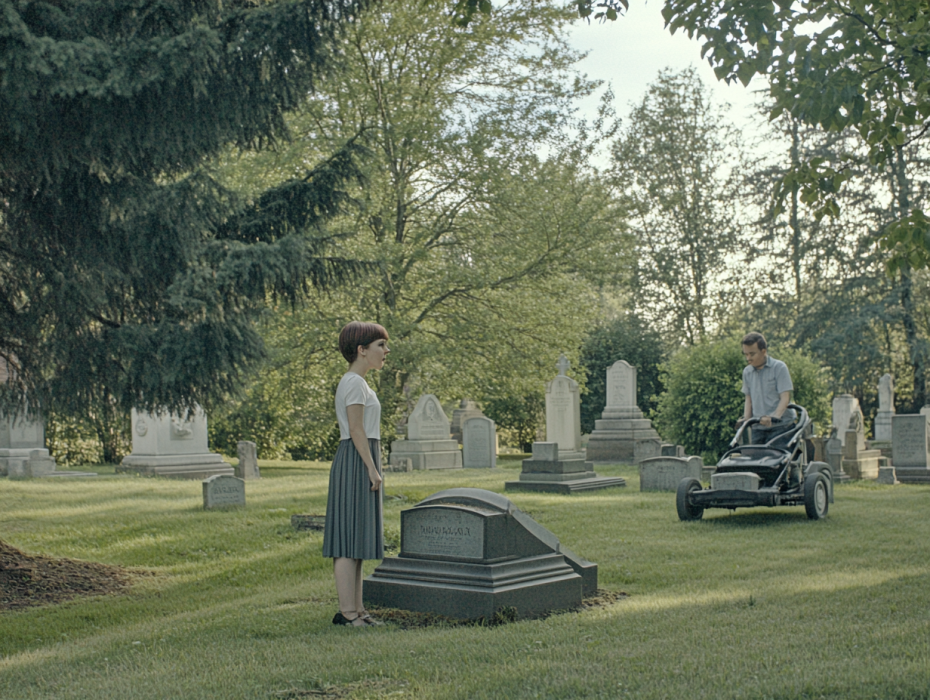
She spotted the caretaker raking near the fence and called out. “Did you tidy this one?” He looked up, puzzled. “No, ma’am. We just mow the grass; nothing else.” Ellen thanked him and walked back slowly, her heartbeat oddly loud. Why would someone disturb her son’s resting place? Ellen felt chilled by the thought.
The air smelled faintly of lilies and rain. Ellen brushed a fallen petal aside, studying the clean grooves of the name carved in stone. Whoever had been here hadn’t harmed; they’d cared enough to tidy up the place. Yet that thought unsettled her. One could fear kindness just as much as malice.
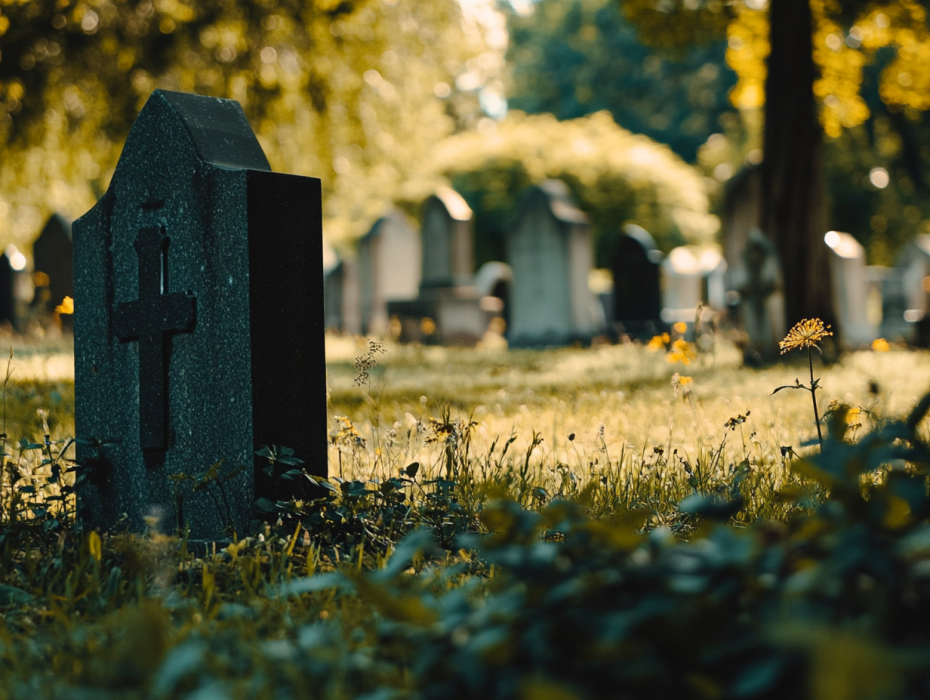
A week later, the same quiet order greeted her. Fresh flowers. Leaves cleared. The vase gleamed in sunlight. Again, there were no footprints or traces of anyone’s visit but hers. She tried to reason it away as the wind, rain, or a coincidence. But grief had trained her to notice details others would overlook.
By the third visit, she began to question her own memory. Maybe she’d misremembered the mess, imagined disorder so she could feel useful tending to it. Grief blurred things that way. Still, when she brushed the soil flat herself that day, she knew exactly how she’d left it.
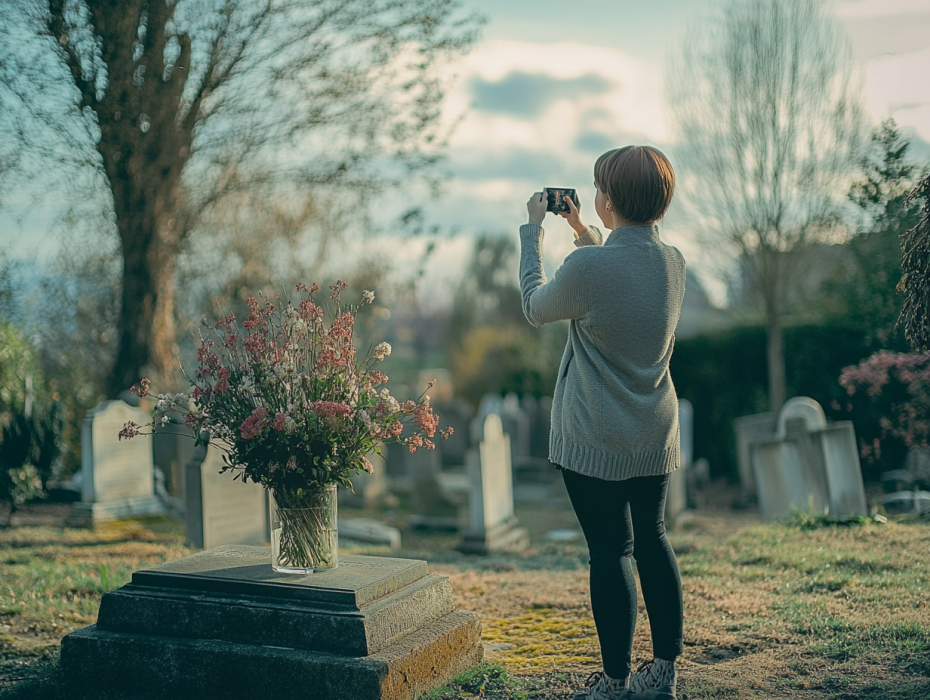
Two days later, she returned with a plan. She took a photo on her phone—flowers tilted left, one petal missing, soil uneven. Gathering proof was a way to anchor her senses. She lingered only briefly, touching the cool stone before walking away, uneasy but determined to see what would change.
When she came back that Friday, the sight made her stomach tighten. There was a fresh bouquet. The flowers faced the other way. The soil, freshly raked, bore faint half-moons of small fingertips. She pulled out her phone, comparing the photo. “Someone’s been here,” she whispered, the wind swallowing her voice.
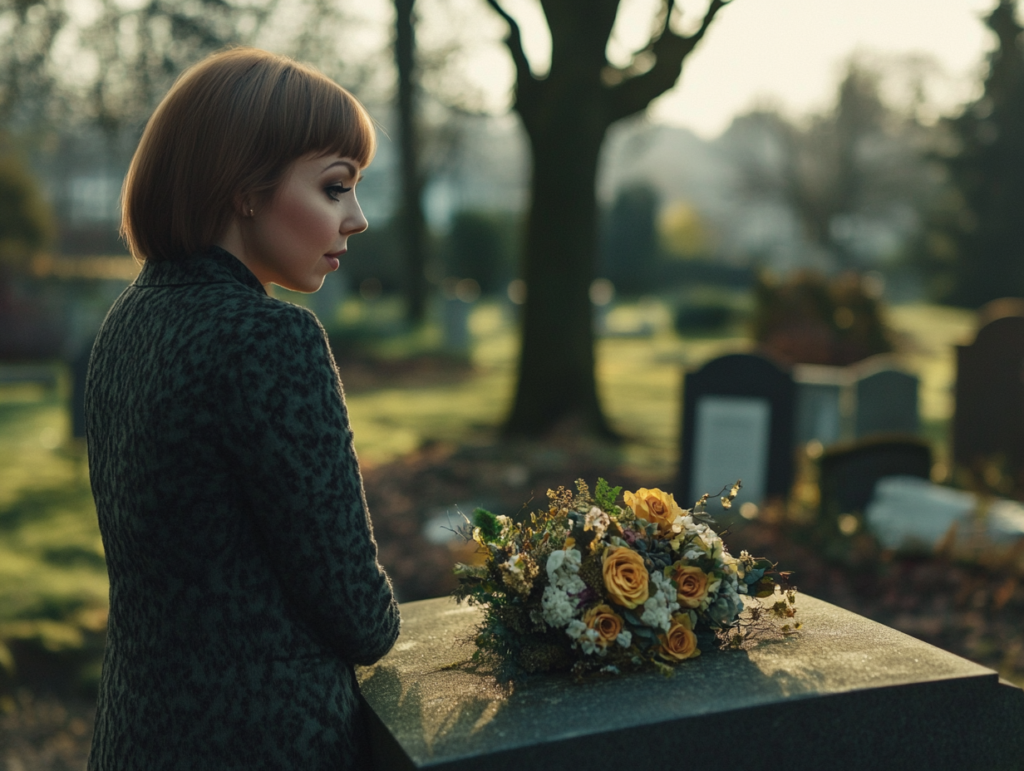
The following afternoon, Ellen brought a small notecard and a pen from home. After placing fresh flowers, she bent over the vase and wrote carefully, Who are you? The words looked absurd on paper, yet necessary. She folded the note twice and tucked it beneath a flower’s stem before leaving.
Driving away, she felt foolish, like a child writing to ghosts. Still, the question hummed in her head. That night she imagined someone finding it, pausing, reading, and deciding what to do. Would they answer? Or had she just scared off the one gentle presence left in Sam’s absence?

A week passed. Each day, she debated returning, afraid of both possibilities: that the note was gone, or still there, untouched. When she finally gathered courage, the grave was unchanged. The flowers had wilted, and the note remained folded, damp from rain. Nothing had moved.
She crouched beside it, fingers tracing the water-warped paper. The silence around her felt different now. It was not peaceful, but deliberate, as if the cemetery itself were holding its breath. “So that’s it then,” she whispered. “Whoever you were, you’re gone.” The words felt like an admission she didn’t want to make.

Two weeks later, on a gray morning, she returned only out of habit. Her steps slowed when she saw it—a tiny toy car, blue and shiny, resting beside the vase. It hadn’t been there before. Her note was gone. But it was apparent that there was to be no answer.
Ellen’s throat tightened. The grave had been cleaned meticulously again. It wasn’t mocking or intrusive; it seemed gentle, and almost reverent. But a cold unease settled in her stomach. Was this just kindness? She was beginning to feel violated, like a trespass into memories too sacred to share.
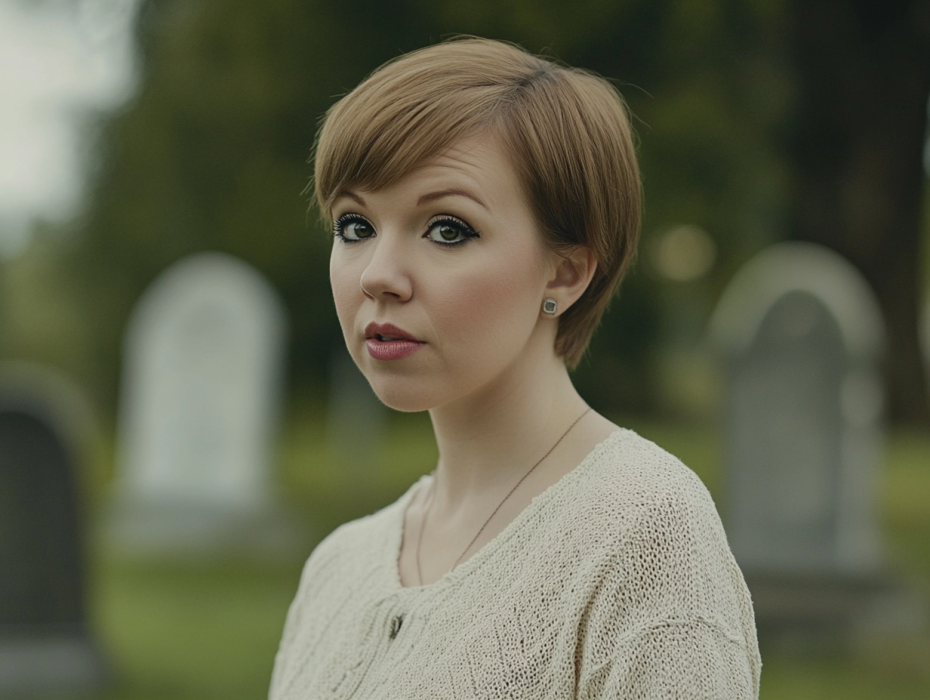
The toy caught the light, a glint of childhood among marble and moss. Ellen lifted it, thumb grazing the worn paint. Sam had owned one just like it once. She thought she’d buried it with him. Her pulse stuttered. The impossible thought surfaced—could it be his?
That night, she sat at her kitchen table, the toy between her palms. Fear and gratitude tangled together in her chest. Someone out there still remembered her son. Someone cared enough to come back, after three years of silence. She couldn’t decide whether to weep or be afraid.

She poured herself tea and let it go cold. The gift didn’t feel like a random act of sympathy; Was it a message? Was it fueled by kindness or obsession? She couldn’t tell. Maybe grief drew strangers the way light drew moths, toward warmth that wasn’t theirs to claim.
By midnight, she’d convinced herself to leave it alone. Whoever this was, they meant no harm. But another thought refused to quiet: Why now? Why begin again after all this time? The question turned restless in her, growing louder than sleep, louder than reason.

In the days that followed, Ellen began to make lists in her notebook—names of anyone who might visit. Old neighbors, teachers, Sam’s friends’ parents. None fit. Eventually, one name hovered at the edge of her mind: her ex-husband, David. He had mourned differently, privately. Maybe this was his way.
But even as she wrote it, she doubted herself. He’d never been sentimental, never one for gestures. Still, she couldn’t shake the thought. Could guilt change a person that much? Ellen stared at the list until the names blurred together. None of them made sense anymore.

Her house carried its usual stillness. Sam’s room remained untouched: model cars on the shelf, an unfinished puzzle on the desk. She stood in the doorway of her son’s room, thinking of how David had insisted on boxing everything up. She’d refused. This was all she had left of her boy.
David had always handled grief by running—first from hospitals, then from her. During Sam’s last months, he’d buried himself in work, visiting only when Ellen begged on Sam’s behalf. Even at the funeral, his eyes had looked past the coffin, fixed on something distant. She’d learned then that love and absence could coexist.

Two days later, Ellen drove to an electronics store, hands trembling on the steering wheel. She bought a small motion-activated camera. It was meant for wildlife or security, not graves. The clerk at the store asked if she needed help learning to set it up. “No,” she said quietly. “I can do it myself.”
That evening, she slipped into the cemetery just before closing. The caretaker gave her a polite nod, unaware of the device hidden inside her purse. When the sun dipped, Ellen crouched by the headstone, tucking the camera into a planter beside the flowers, its lens angled toward the grave.
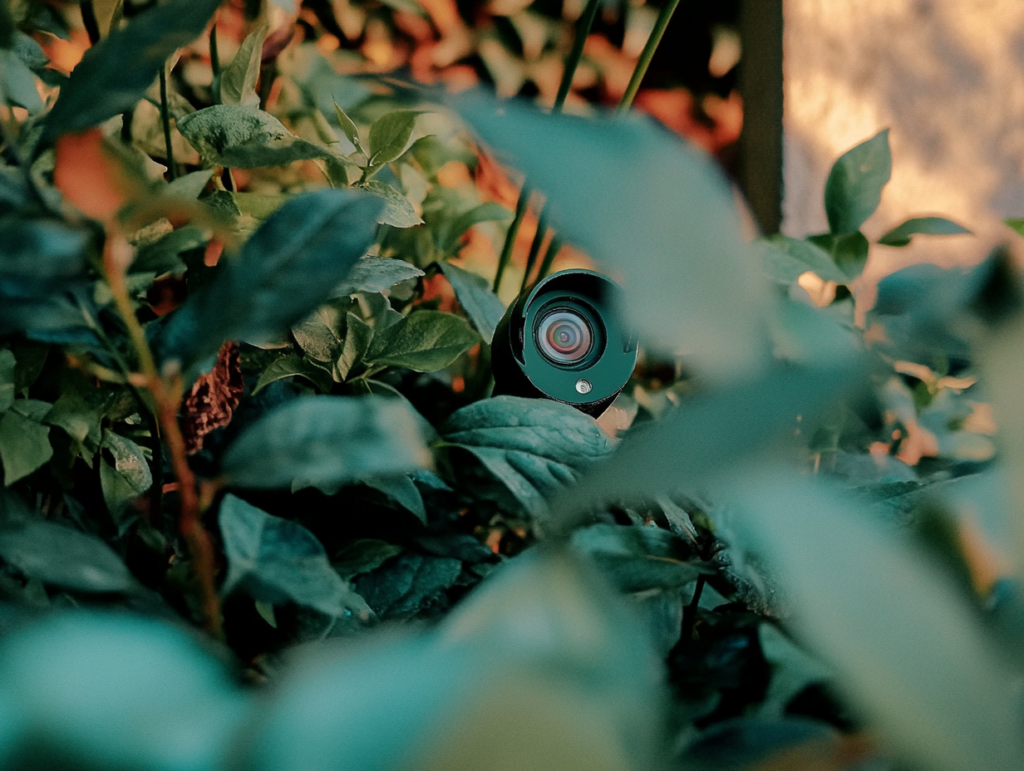
She tested it once, the tiny red light blinking faintly in the dark. Recording the place where her son rested felt invasive, but she couldn’t bear another unanswered visit. “If it’s David,” she murmured, brushing dust from the stone, “I’ll finally have proof.” The wind answered with a hollow sigh.
For the next few nights, Ellen hardly slept. Each morning, she rushed to check the footage, only to find mostly just rain drifting through lamplight, leaves trembling under wind, and stray cats darting between headstones. Her frustration mounted. Maybe whoever it was had stopped, sensing they were being watched.

By the fourth night, fatigue dulled her hope. She almost didn’t check the camera at all, until she saw the blinking notification: motion detected at 2:37 a.m. Her pulse spiked. Ellen fumbled with the buttons, hands clumsy, breath catching as the screen flickered to life.
The image was grainy, black and white, framed by shadows. A hooded figure entered from the edge. The person was slender, and hesitant. They knelt, head bowed, and for a long moment didn’t move. Then, with trembling hands, they placed something on the ground. Ellen leaned closer. It was another toy, glinting faintly in the night.

Her heart pounded as the figure brushed the soil smooth, tracing circles near Sam’s name. The movements were deliberate and gentle. She squinted at the outline. She couldn’t make out the face. The person seemed small. Was it David? Had he lost weight, perhaps? She froze the frame, enlarging the image until it blurred completely.
Ellen’s breath came in shallow bursts. The figure wore a light-colored coat, hood pulled up, concealing most of their face. But there was something familiar about the way they held themselves. It was careful, almost fragile. She tried to capture a still image, but the file corrupted, pixels bleeding into static.
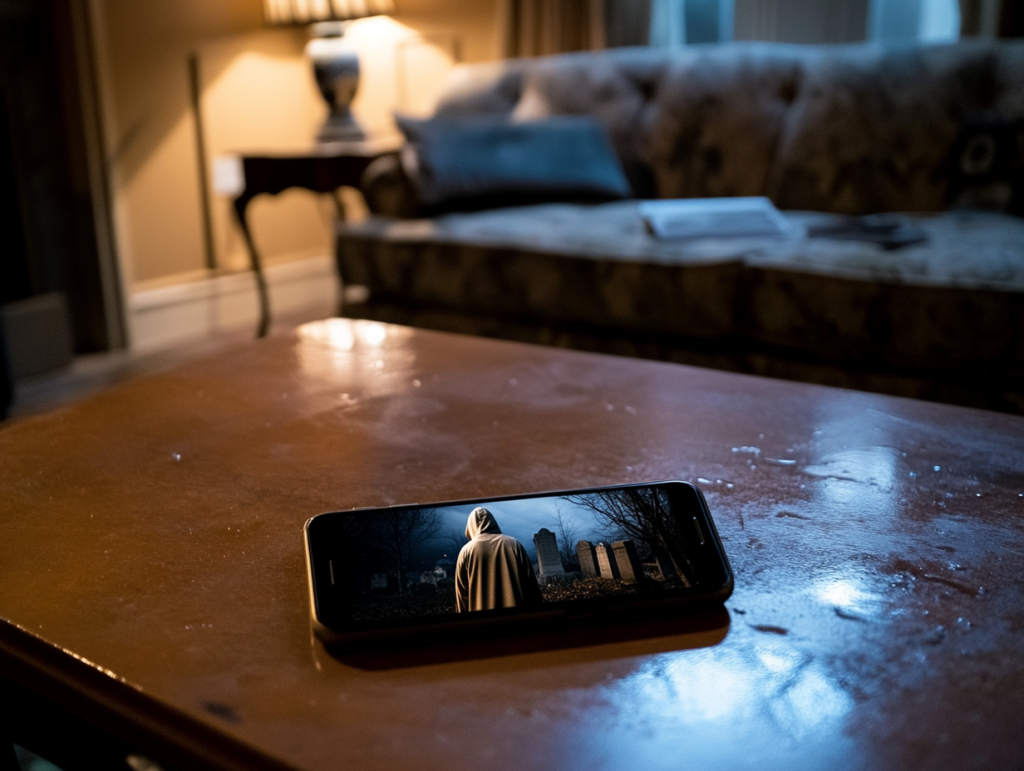
The recording glitched again. The figure turned slightly, just enough for a glimpse of a shadowed cheek, and then the camera went dark. The battery had probably died. Ellen stared at the frozen screen, her own reflection hovering over the image. The silence in the room felt heavier than before.
She sat there for hours, replaying the fragments, each one feeding worse thoughts than the last. Whoever it was, they’d known exactly where to look. The way they handled the toy—gently and lovingly—felt too intimate to be random. And yet, Ellen couldn’t entirely be sure of their identity. The mystery had only deepened.

The next morning, unable to hold it in any longer, Ellen transferred the clearest frame from the video to her phone. It was blurred beyond recognition, yet she sent it anyway. Is this you, David? Her message was short, brittle. Within minutes, his reply came: What are you talking about? That’s not me.
She typed back furiously, thumbs trembling. You expect me to believe that? A moment later the reply came: Ellen, calm down. I don’t even live near anymore. His certainty unsettled her more than denial would have. I can come see it myself, he added. You’ll know it’s not me.

Ellen hesitated for hours before agreeing. She didn’t want him in her house, yet something about the steady tone, almost kind, disarmed her. Maybe confronting him in person would finally end this spiral of doubt. She sent a curt reply: Fine. Tomorrow at four.
When David arrived, she barely recognized him. His hair had thinned and grayed; the confident posture she remembered was gone. He held his hat in both hands like a man at confession. “You look well,” he said, voice tentative. “You should come in,” she answered, gesturing toward the living room.

They watched the footage together. David leaned forward, studying the blurry image, brows knitting. “That’s not me,” he said softly. “I swear, Ellen. Look, the build, the height… it’s someone smaller.” His tone wasn’t defensive. It was weary, honest, and oddly compassionate. Ellen’s anger wavered.
After a long silence, he sighed. “I did visit once,” he admitted. “The year after we lost him. I brought flowers. I wanted to tell him I was sorry for not being there enough. But it hurt too much. I never went back.” His voice cracked slightly on the last word.

Ellen studied him, searching for deceit, but found only exhaustion. The man before her wasn’t the cold stranger who’d walked out of a hospital corridor three years ago. He looked smaller, humbled. “You could’ve told me,” she said. “I didn’t think you’d want to know or hear from me,” he whispered.
Then, quietly, almost shyly, he added, “I’m remarried, Ellen. We’re expecting a baby.” The news caught her off guard. After a brief flicker of warmth, she could only summon resentment. “Congratulations,” she said flatly. It explained the calm distance. He had built a new life, while she continued to live the old one.

When he left, she stood at the door watching him cross the street, hands deep in his pockets. For the first time, she believed him. Whatever ghosts lingered at Sam’s grave weren’t his. But the question gnawed at her. If it wasn’t David, then who cared enough to keep visiting?
Ellen couldn’t stop watching the footage. Each time, her attention drifted from the shadows to the hands and the way they brushed the soil smooth, arranged the toy neatly, and paused as though whispering something. The movements were carefully precise. Whoever it was, they seemed to approach the grave with tenderness.

She found herself memorizing those gestures, pausing the video several times. It could be someone who cared deeply. But the realization frightened, rather than comforting her. Why did this stranger seem to mourn more gently than she could? And why did it feel, somehow, like love?
That night, sleep wouldn’t come. Ellen sat by the window, laptop open, watching the grainy images on loop. Outside, the wind whispered through the trees, echoing faintly like her son’s voice. Somewhere between exhaustion and ache, she whispered back, “Who are you?” But the room answered only with silence.
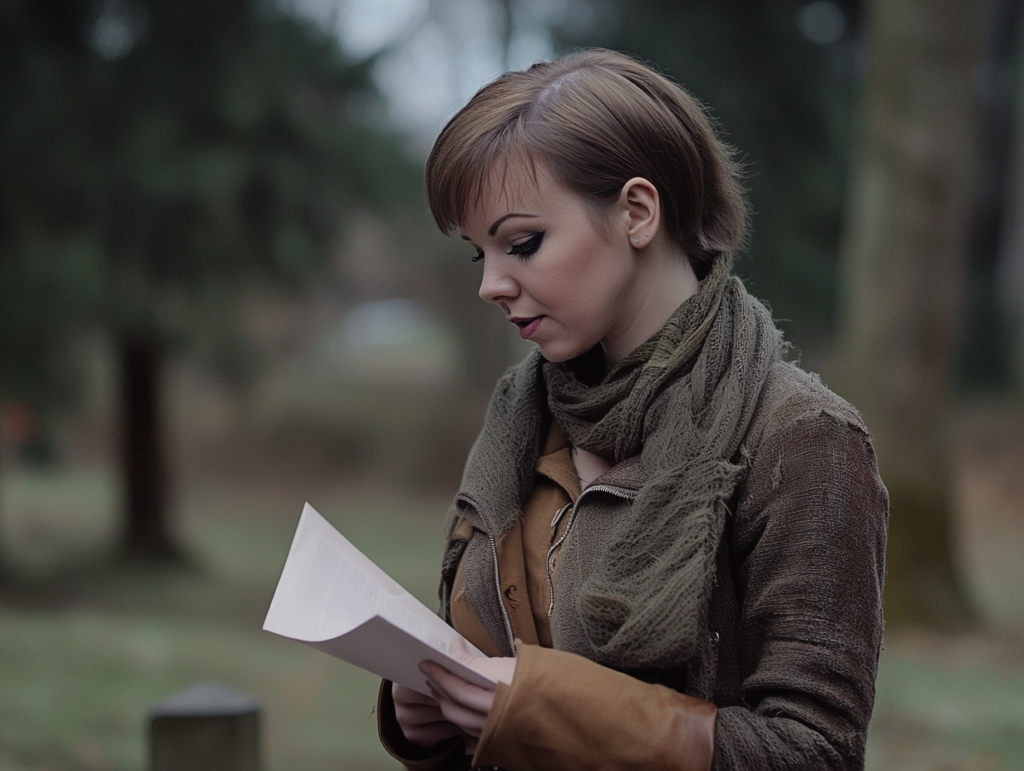
The next morning, she returned to the cemetery, gravel crunching under her shoes. The grave looked undisturbed at first, until she saw a folded piece of paper tucked under a flower stem. Her heart skipped. Hands trembling, she pulled it free. The note read: Sleep peacefully, brave boy.
The handwriting was unfamiliar. It was soft and rounded, neither masculine nor feminine. Ellen stared at it for a long moment, her breath visible in the morning chill. Whoever wrote it knew how hard Sam had fought. Everyone who knew him called him “a brave boy.”.

She stood there for a long time, unsure whether to feel comforted or violated. Was this a stranger offering compassion? Was it someone who had known Sam intimately, or someone who wanted to get at her through his death? The thought sent a shiver through her.
Driving home, Ellen’s thoughts tangled between fear and yearning. The gentle and deliberate handwriting on the note wouldn’t leave her mind. Whoever wrote it seemed to know the right words, as if they’d once stood beside her in the same pain. But she couldn’t remember anyone who ever had.

That night, she sat in Sam’s room again, fingers trailing over his toys, books, and the pillow he once hugged to sleep. The note lay on her lap, edges slightly damp from the morning dew. It felt alive somehow, carrying traces of both grief and gratitude.
Ellen thought about reaching out to the police or the hospital, but stopped herself. What would she even say? “Someone’s leaving kindness on my son’s grave”? It sounded foolish. Yet each word on that paper pulsed through her mind—tender and heartbreakingly familiar. She pressed it to her chest, unable to let go.

The days that followed blurred together. Ellen moved through them as if underwater, every sound distant, every light dim. Her grief felt raw again, stripped of the dull armor time had built. Sometimes, when the house was quiet, she could still hear Sam’s laughter echoing faintly. It was half a memory, but always haunting.
Ellen stopped by the cemetery office the next morning, her voice careful, polite. “Has anyone signed in after hours? Or asked to visit plot nineteen?” The caretaker shook his head. “No cameras at the gates,” he said with a sigh. “Sometimes families sneak in through the fence. Grief does strange things.”
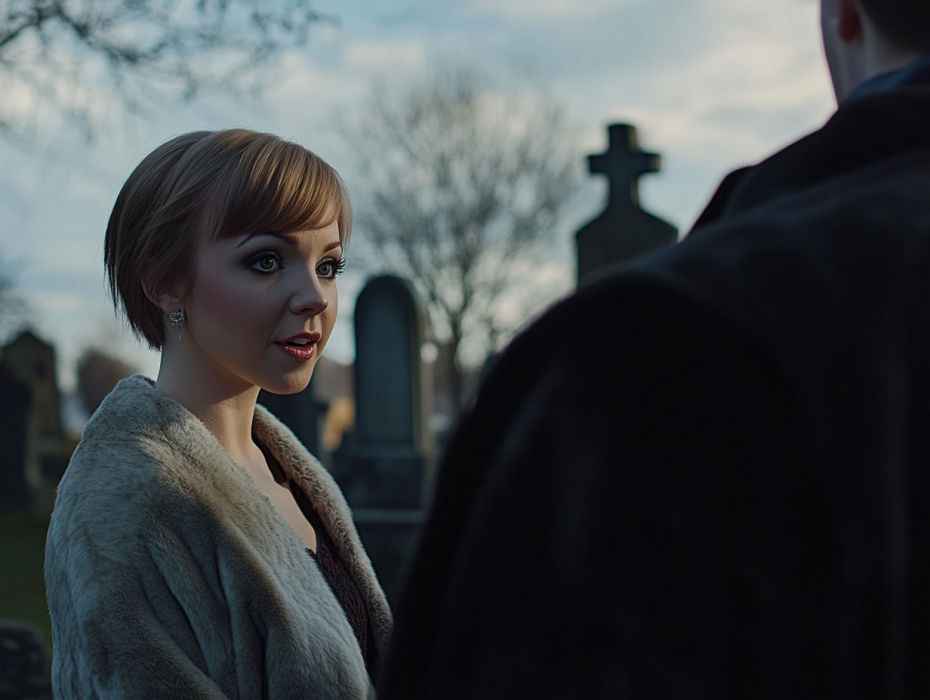
That night, unable to rest, she drove past the cemetery again, headlights dimmed to a glow. The road wound through mist, trees arching overhead. Then she saw a flicker between branches, faint and unsteady. A flashlight? Or just reflection? She pulled over, heart racing, but when she stepped out, only rain answered.
Back home, she sat at the kitchen table, tracing the rim of her mug, replaying faces from the funeral in her mind. Neighbors. Teachers. Sam’s friends, older now. Could it be one of them? Someone trying to honor him quietly? Each possibility made sense until it didn’t.

Then a stranger came to mind. Could it be someone who’d read Sam’s story in the paper years ago, and was perhaps touched by it? The thought made her skin crawl. What if this person she’d never met had decided to share her grief, to claim a piece of it as their own?
From that evening, Ellen began leaving her porch light on. It cast a small pool of warmth across the lawn, but she couldn’t tell if it comforted or exposed her. Each creak of the floorboards felt like footsteps. Each shadow looked too familiar. She no longer knew whom to fear.
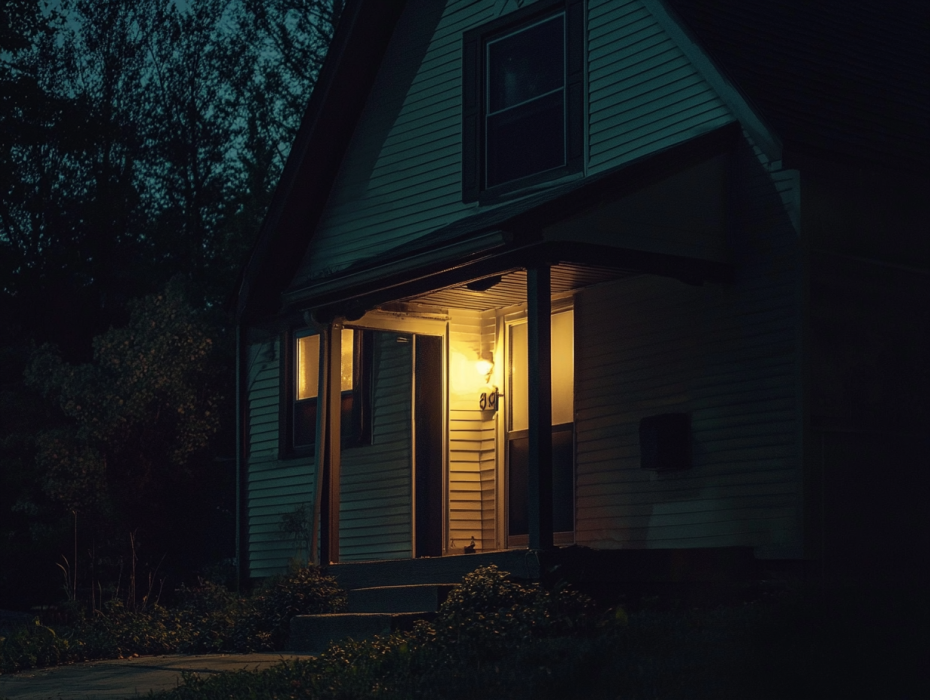
By the weekend, Ellen’s nerves had stretched thin. She returned to the cemetery with fresh batteries and a new camera, smaller and quieter. She placed one near the flowers, and the other beneath a low bush facing the path. This time, she’d catch the visitor’s face, their hands, and their intent.
Rain clouds gathered as she worked, the air thick with static. She whispered an apology to Sam for turning his resting place into a stakeout. “I just need to know,” she said softly. Her reflection in the polished stone looked like someone she didn’t recognize. She was tired, frightened, and still searching.

That night, she kept her phone beside her bed, the camera app open. Each time the wind howled, she checked for notifications. Hours slipped by, uneventful, until near dawn when the motion alert flashed. But when she opened the feed, only darkness moved across the frame like breath.
Days passed with nothing but restless wind and shivering trees captured on video. The footage blurred into shadow, silence, and night. Ellen began to wonder if the mysterious visits had stopped for good, or worse, if the stranger had found her cameras and simply changed their routine.

By the third week, the pattern had grown too quiet. The absence itself became unnerving, like the calm before a storm. Ellen checked the cemetery from the road most evenings, headlights off, pulse hammering each time she turned the corner. Every night, the graves slept undisturbed. Until one night it didn’t.
One stormy evening, wind lashed the street as thunder rolled over the hills. Ellen caught a flicker of movement by the side gate. A figure was slipping through, small against the rain. Her stomach twisted. Without thinking, she grabbed her keys and drove toward the cemetery, tires slicing through puddles.
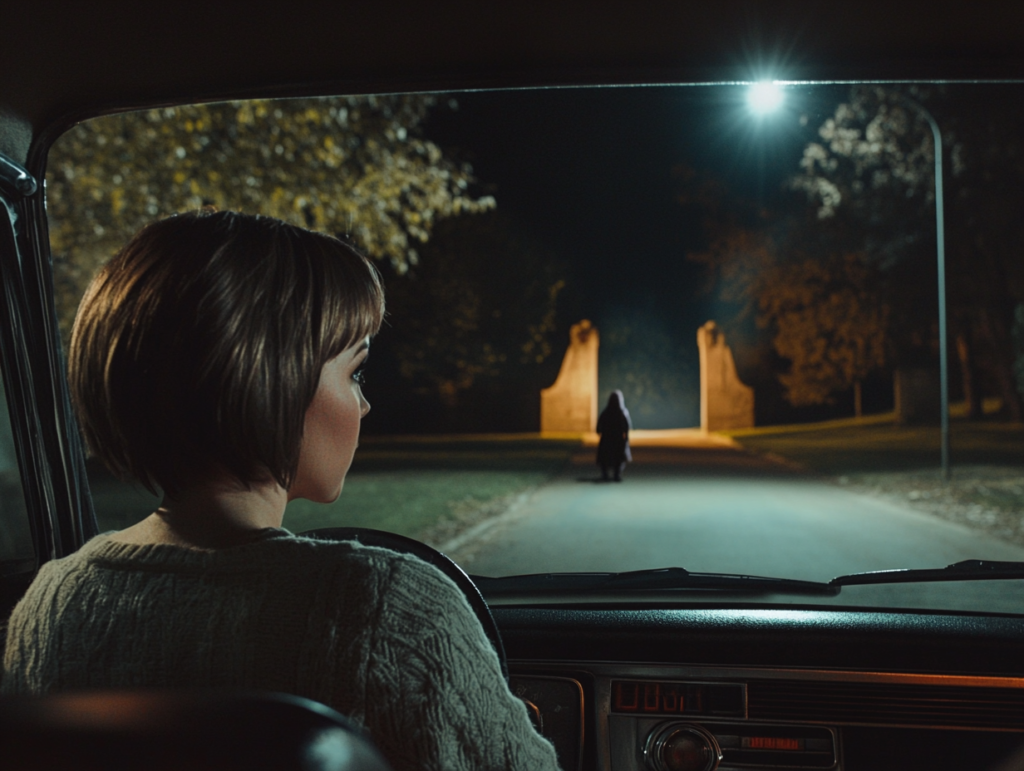
The gate creaked when she pushed it open. Lightning flashed, illuminating rows of headstones like pale sentinels. Ahead, a lone figure knelt before Sam’s grave. Ellen froze, heart pounding so loudly she thought it might give her away. The person’s shoulders trembled, rain pooling in the folds of their coat.
She crept closer, the sound of rain masking her steps. The figure was placing something on the grave. This time it was a small, worn teddy bear. The gesture was tenderly ceremonial. The stranger bowed their head, lips moving in what might have been prayer, apology, or memory. Ellen’s breath hitched.
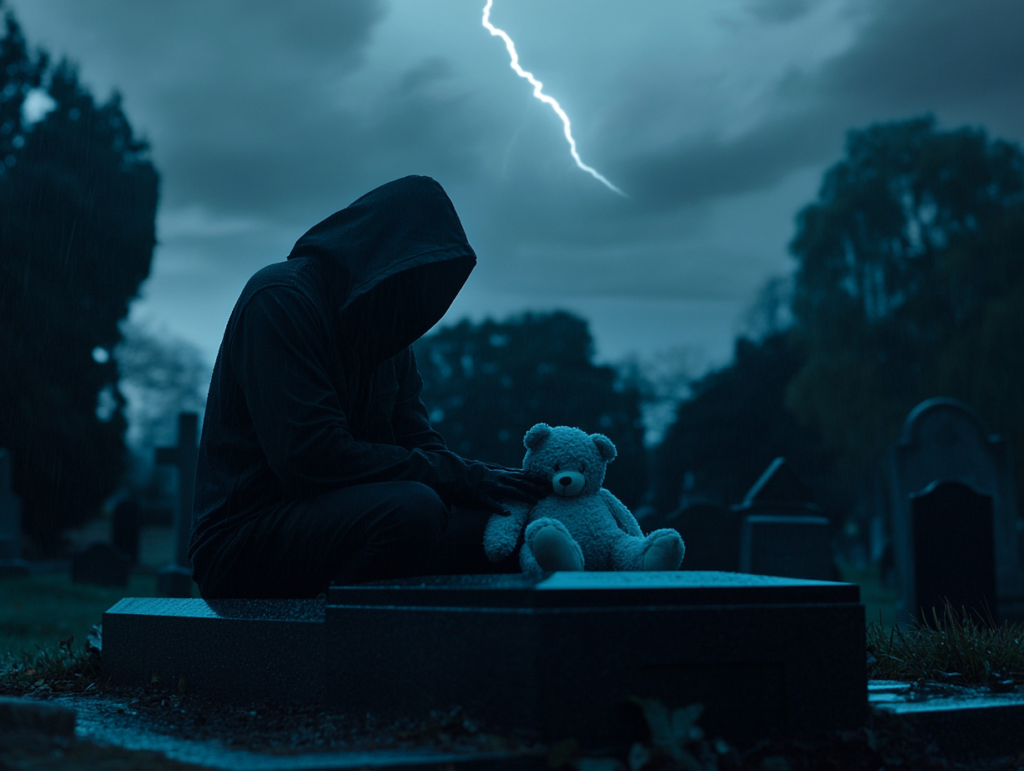
Lightning tore across the sky again. The stranger’s silhouette wavered, fragile yet deliberate. For a heartbeat, Ellen hesitated, unsure if she was about to confront a ghost from her past or someone else’s grief entirely. The wind howled through the trees as she finally stepped from the shadows.
Her voice came out steadier than she expected. “Why are you doing this?” The figure flinched, freezing mid-motion. Slowly, they turned toward her. The hood slipped back, rain glistening on pale hair and tired eyes. In that single, suspended moment, Ellen’s anger faltered, replaced by recognition she couldn’t yet name.
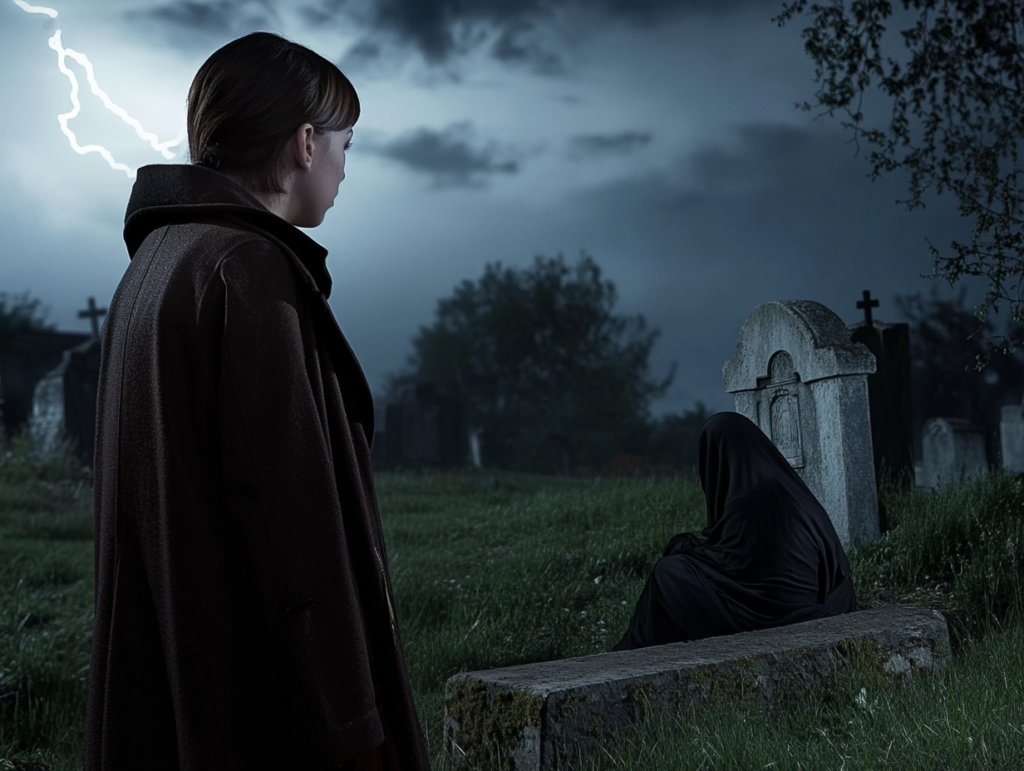
The woman turned fully, rain streaking down her face. Ellen gasped. It wasn’t a stranger at all but a face from the most painful corner of her memory. “I’m sorry,” the woman whispered. “I didn’t mean to frighten you.” Her voice trembled. “I’m Anna. I was one of Sam’s nurses.”
Ellen stood frozen, the storm muffled into silence. Anna’s eyes were red, hollow, yet kind. “You probably don’t remember me,” she continued, “but I remember you, sitting by his bed every night. You never left. I used to think, if every child had a mother like that, maybe we’d lose fewer.”
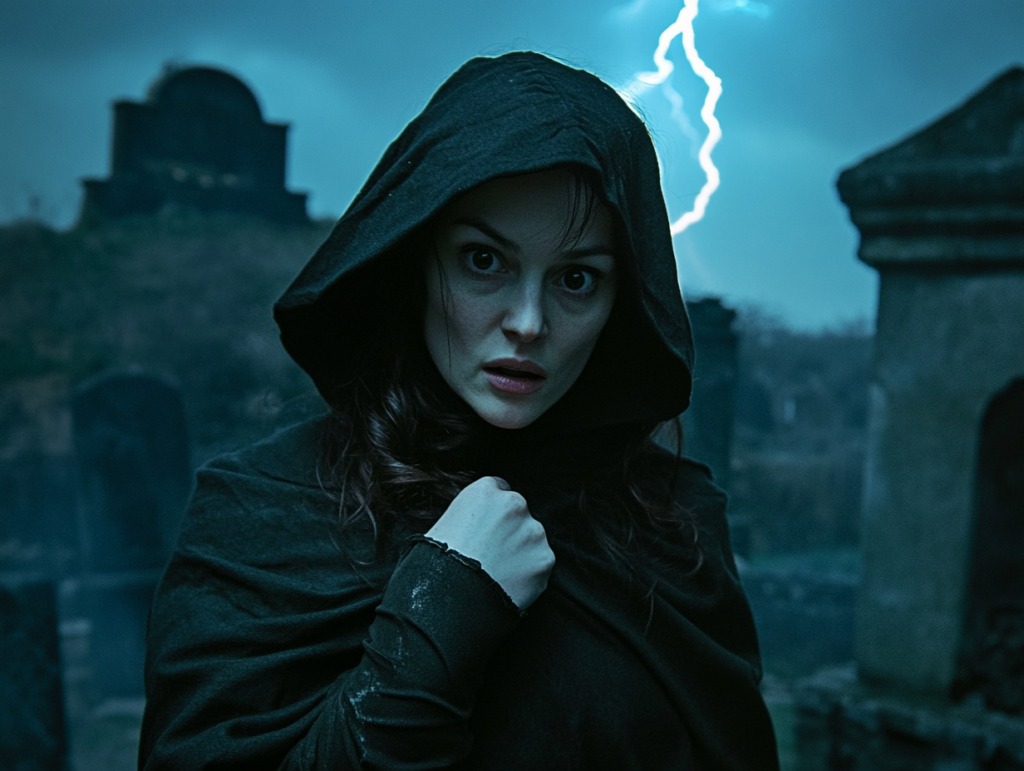
Anna’s hands shook as she spoke. “I was with him when… when he stopped breathing. He thanked me, you know. Said I helped him breathe easier.” Her voice cracked. “I was already under tremendous professional strain then. After him, I couldn’t work another shift. I meant to visit, but I couldn’t face you or the ward again.”
She swallowed hard, looking toward the grave. “I left nursing a month later. I went to therapy. Everyone said it wasn’t my fault, but I couldn’t believe them. His face stayed with me, the way he smiled that last morning. I kept one of his toys by my bedside for years.”
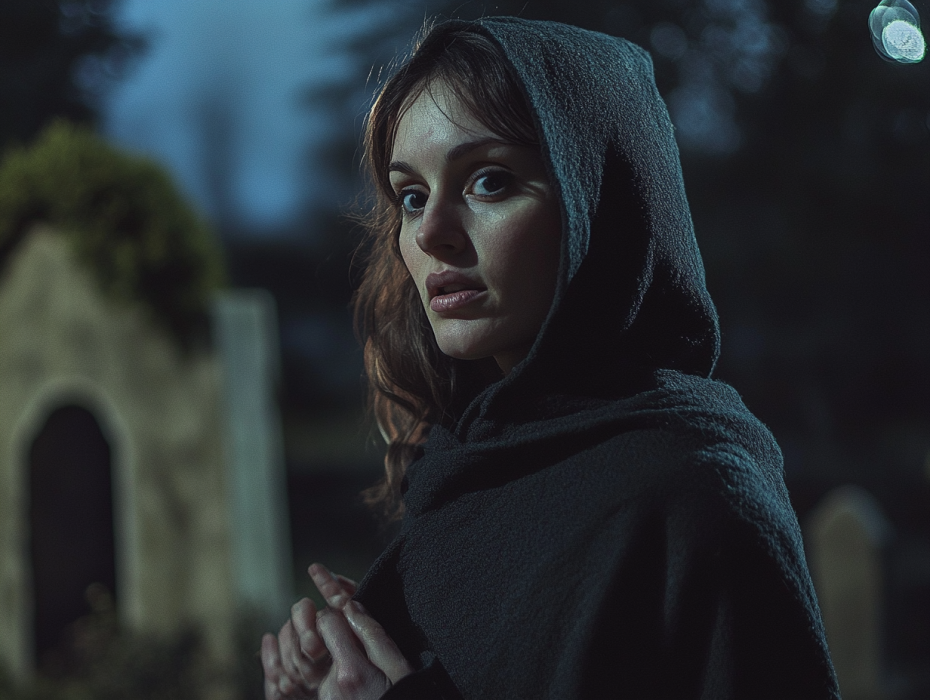
“When I finally felt strong enough, I came here. I just wanted to say goodbye properly, to thank him for helping me find peace again.” She looked at Ellen with tearful sincerity. “I never meant to scare you. I thought I was invisible, that no one would pay attention to my visits.”
Ellen’s anger drained away, replaced by something softer. She felt an ache akin to release. She saw that Anna wasn’t an intruder, only another soul haunted by the same boy. “Why didn’t you reply to my note?,” Ellen asked. “We could’ve remembered him together.” Anna smiled faintly. “I didn’t feel ready.”
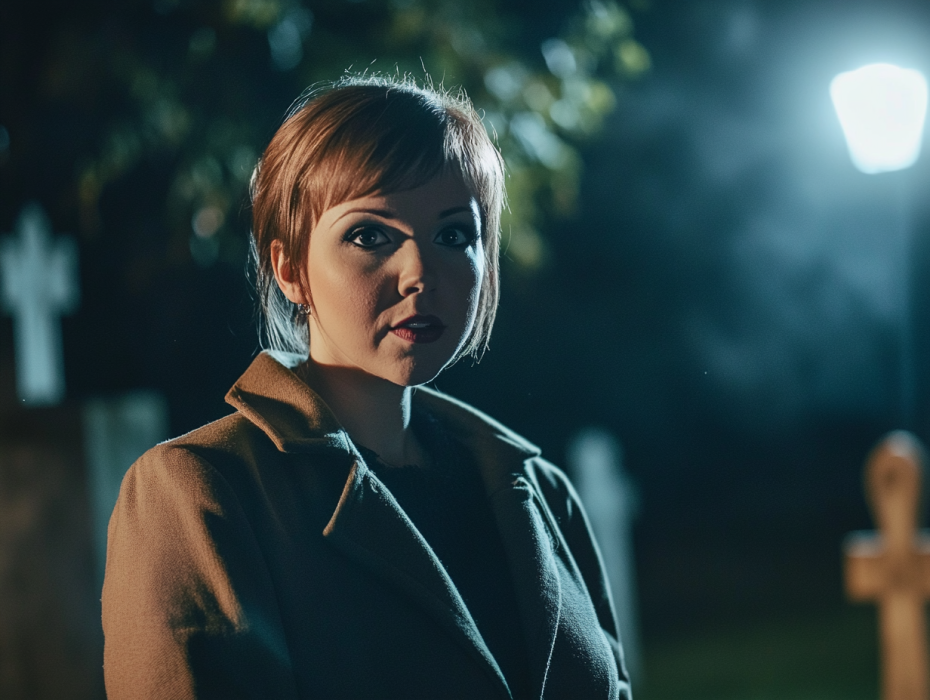
For a long moment, neither woman spoke. The rain slowed to a gentle patter, the cemetery breathing in rhythm with their silence. Ellen finally said, “He liked you. I remember him telling me you made the hospital feel less like one.” Anna nodded, tears shining. “He made the world feel kinder.”
They sat together by the grave as the clouds parted. The air smelled of wet earth and lilies. Anna reached into her pocket and pulled out a small car. Its paint was chipped, and the wheels were loose. “This was one was his favorite,” she said. “I think it’s time I gave it back.”
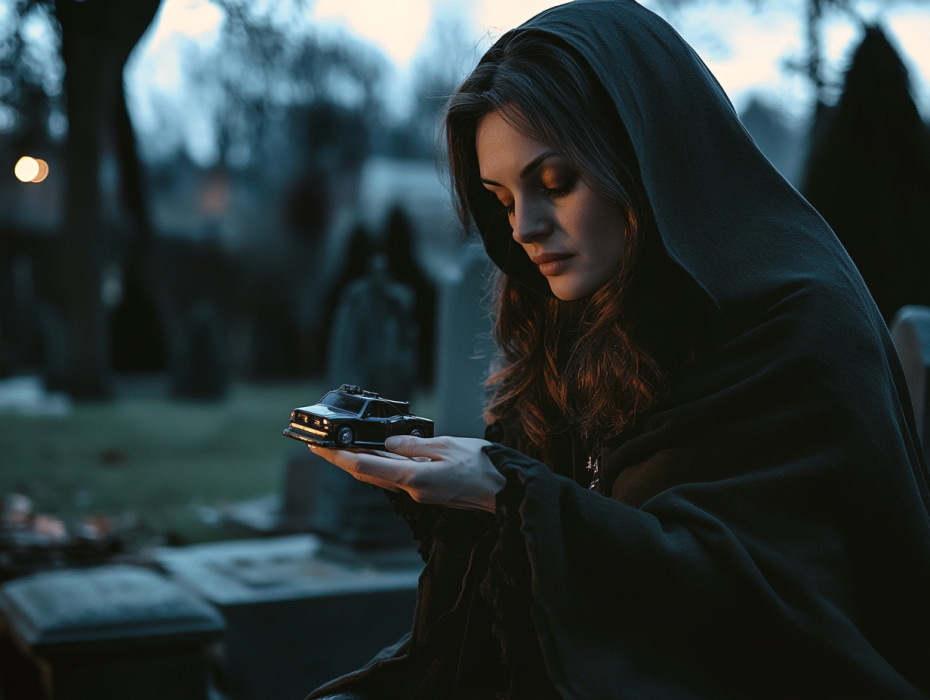
She placed it carefully beside the stone, fingers trembling. Ellen reached out, covering her hand. “Thank you,” she whispered. For the first time in years, her grief didn’t feel like drowning. It was like breathing again. Two mothers, in different ways, letting go of the same child.
They stayed until the sky cleared completely, talking quietly about small things like Sam’s laugh, the toy cars, and the way he’d named each one after planets. When they finally stood, Ellen felt lighter, her chest open in a way it hadn’t been since that day at the hospital.

As they walked away, the camera’s tiny red light blinked once in the shadows, still recording. It had captured everything, including the storm, the confrontation, and the understanding that followed. What began as proof of intrusion had turned into a quiet record of two people finally finding peace.
